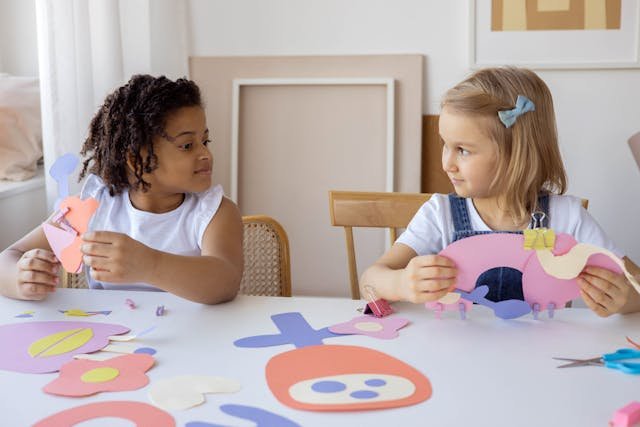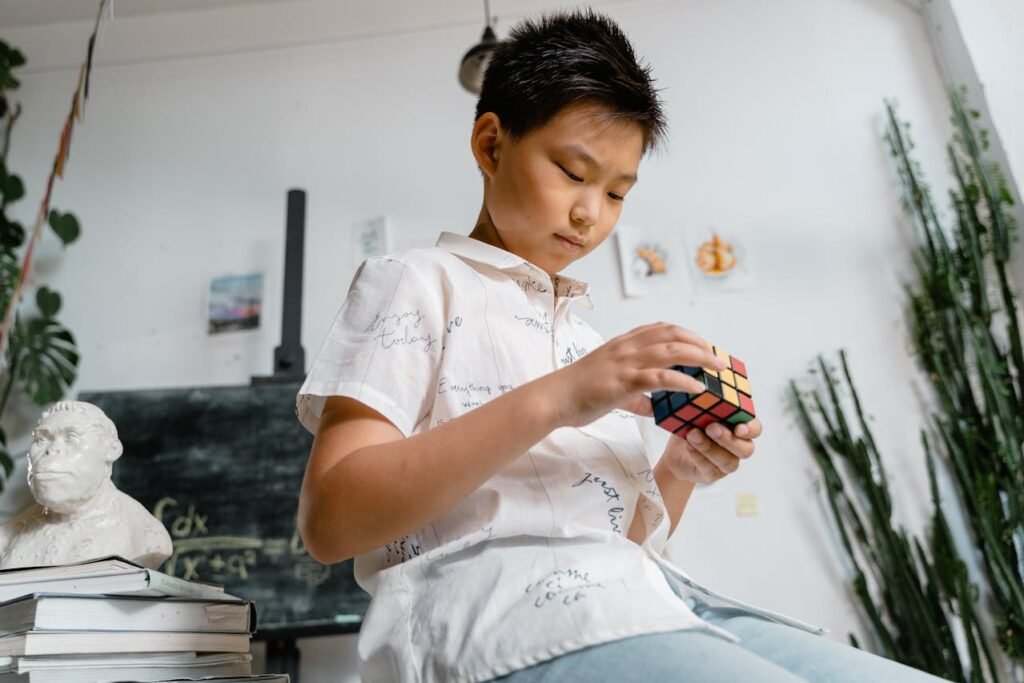Have you ever watched your child figure out how to fit puzzle pieces together, ask a surprising “why” question, or suddenly understand how to count to ten? These little moments are not random—they are signs of cognitive development.
Cognitive development is simply a fancy way of saying “how a child’s brain grows and learns to think.” It includes everything from memory and problem-solving to language, focus, and imagination. It’s about how kids understand the world, make sense of it, and use that knowledge every day.
As parents, understanding cognitive development helps us see the bigger picture. It explains why your toddler insists on asking “why” a hundred times, why your preschooler loves pretending to be a superhero, or why your teenager suddenly starts debating you like a lawyer. Each stage is part of a journey that helps children grow into independent, confident thinkers.
What Exactly Is Cognitive Development?
At its core, cognitive development means how a child’s brain grows in its ability to think, understand, learn, and remember. It’s not about the size of the brain—it’s about how it works.
When a baby first learns to recognize their parent’s face, that’s cognitive development. When a toddler realizes that shaking a rattle makes noise, that’s cognitive development. When a child figures out how to solve a math problem or plan out a game with friends, that’s cognitive development too.
It’s like the brain is building new “roads” and “bridges” every day, connecting ideas and making it easier to understand the world.
Why It Matters
Cognitive development is not just about school or grades—it affects every part of life. A child who can focus well, solve problems, and think creatively is better prepared for challenges, whether it’s learning to ride a bike, making friends, or later, handling responsibilities at work.
Strong cognitive skills also support emotional growth. When kids can understand situations better, they’re less frustrated, more confident, and able to make smarter choices.
Key Areas of Cognitive Development
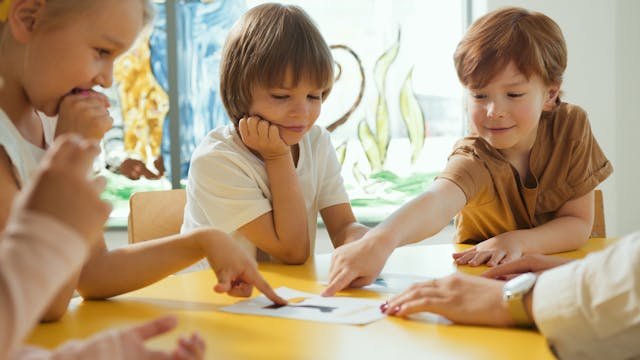
Cognitive development can sound like one big idea, but it actually includes many smaller skills that work together. Here are the main areas:
1. Attention and Focus
The ability to concentrate on a toy, a story, or homework without being distracted. Even babies practice this when they follow a moving object with their eyes.
2. Memory
The ability to store and recall information. First, babies remember familiar faces. Later, children memorize songs, stories, and eventually study facts for school.
3. Problem-Solving
The skill of figuring out what to do when faced with a challenge—like how to get a toy out from under the couch or how to finish a tricky puzzle.
4. Language and Communication
The ability to understand words and express ideas. This starts with babbling, grows into full sentences, and later develops into reading, writing, and even debating.
5. Thinking and Reasoning
The skill of making sense of information. For young kids, this might be realizing that if it’s raining, they need an umbrella. For older kids, it could mean understanding abstract concepts like fairness or justice.
Everyday Examples
To see cognitive development in action, just watch your child:
- When your baby smiles back at you, they’re learning recognition.
- When your preschooler sorts blocks by color, they’re practicing categorization.
- When your older child explains the rules of a game, they’re building logic and communication skills.
All of these everyday actions are part of the same journey—the growth of the mind.
The Stages of Cognitive Development

Cognitive development doesn’t happen all at once. Just like walking or talking, it unfolds in stages. Each stage builds on the one before it, and each has its own “milestones” or signs of growth.
One of the most famous psychologists, Jean Piaget, described four major stages of cognitive development. His ideas are still widely used because they match what parents observe every day. Let’s break these down in very simple terms.
Stage 1: Infancy (Birth to 2 Years) – The Sensorimotor Stage
During the first two years, babies are like little explorers. They don’t yet think in words—they think with their senses (seeing, hearing, touching) and movements (grabbing, crawling, walking).
- Milestones to notice:
Babies learn that objects still exist even when they can’t see them (this is called object permanence). For example, if you hide a toy under a blanket, a baby eventually learns it’s still there. They also begin to understand cause and effect—like shaking a rattle makes sound.
Stage 2: Early Childhood (2 to 7 Years) – The Preoperational Stage
Now children start thinking in words and images. They have big imaginations and love pretend play. However, their thinking is still very concrete and self-focused.
- Milestones to notice:
Kids start using language in full sentences, ask lots of “why” questions, and enjoy make-believe games. They may struggle to see another person’s point of view. For example, if they cover their eyes, they might believe you can’t see them either.
Stage 3: Middle Childhood (7 to 11 Years) – The Concrete Operational Stage
At this stage, thinking becomes more logical and organized, but still tied to concrete experiences. Kids can solve problems, understand rules, and think about how things relate to each other.
- Milestones to notice:
Children grasp concepts like conservation (knowing that liquid poured into a tall glass is the same amount as in a short one). They can sort objects, do basic math, and understand that others have different perspectives.
Stage 4: Adolescence (12 Years and Up) – The Formal Operational Stage
By the teenage years, kids begin to think more abstractly. They can imagine future possibilities, debate ideas, and think about things they can’t directly see or touch.
- Milestones to notice:
Teens develop skills like reasoning, problem-solving, and forming opinions. They can think about fairness, justice, and even hypothetical scenarios like “what if…?” This is also when critical thinking and planning for the future become strong.
Why Stages Matter
Understanding these stages helps parents set realistic expectations. For example, a three-year-old who thinks the sun follows them home is not “wrong”—they are simply in a stage where their imagination is stronger than logic. By knowing this, you can guide your child patiently instead of worrying.
What Shapes Cognitive Development?
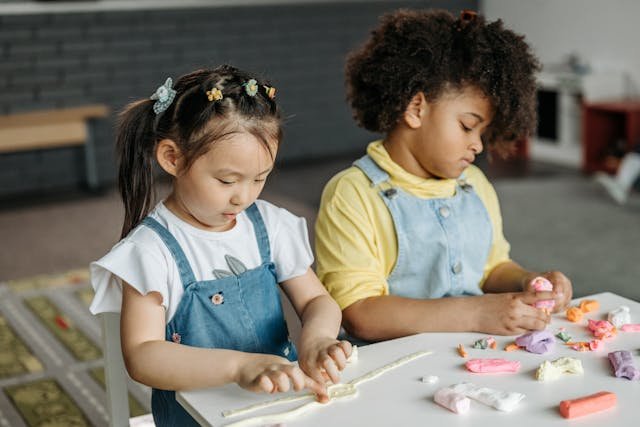
Cognitive development doesn’t just “happen” on its own. It grows out of a child’s interactions with the world. Some factors boost it, while others can hold it back. Understanding these influences helps parents create the best environment for their child’s growing mind.
1. Play and Exploration
Play is not just fun—it’s brain work. When a toddler stacks blocks, pretends to cook, or plays hide-and-seek, they are practicing problem-solving, memory, and creativity. For older kids, games like chess, puzzles, or even building with LEGO sharpen logic and planning.
Parent Tip: Give your child time for both free play (where they choose what to do) and structured play (games with rules). Both kinds grow the brain in different ways.
2. Language and Conversation
Talking with children is one of the most powerful tools for cognitive growth. Every “why?” question a child asks is a chance to stretch their reasoning skills. Reading stories aloud builds vocabulary, imagination, and comprehension.
Parent Tip: Don’t just answer with yes or no. Expand on their questions. If your child asks, “Why is the sky blue?” you might say, “Because light from the sun scatters in the air. Do you want to see how light bends with a glass of water?” Curiosity feeds growth.
3. Relationships and Social Interaction
Children learn by watching and interacting with others. When they play with friends, they learn to take turns, solve conflicts and disagreements, and see different points of view. Family discussions also help them learn reasoning and empathy.
Parent Tip: Encourage group activities, whether it’s family board games or school projects. These experiences build both thinking skills and social understanding.
4. Environment and Experiences
Children thrive when they are exposed to rich experiences. Trips to the park, museums, or even the grocery store provide opportunities to ask questions and make connections. A stimulating environment encourages curiosity and exploration.
Parent Tip: Everyday life can be a classroom. Cooking dinner can teach measurement, shopping can teach counting and money skills, and gardening can teach science.
5. Nutrition and Health
The brain is a physical organ, and it needs fuel to function. Proper nutrition, sleep, and exercise are critical for memory, focus, and problem-solving. Children who are well-rested and well-fed can concentrate better and learn faster.
Parent Tip: Make sure your child gets a balanced diet, regular sleep, and plenty of physical activity. These basic needs are the foundation for strong cognitive growth.
6. Challenges and Opportunities
Kids grow when they face challenges just hard enough to stretch their abilities. If tasks are too easy, they get bored. If too hard, they get frustrated. Finding the right balance helps children build resilience and confidence.
Parent Tip: Encourage your child to try new things, even if they fail at first. Remind them that mistakes are part of learning, not signs of weakness.
How Parents Can Support Cognitive Development at Home

You don’t need a lab, expensive toys, or complicated lessons to help your child’s brain grow. The best support often comes from everyday moments filled with love, conversation, and curiosity. Here are ways parents can actively nurture cognitive growth at home.
Encourage Curiosity Through Questions
When your child asks “why,” resist the urge to give a quick answer. Instead, turn the question back to them: “What do you think?” This encourages them to reason and problem-solve. Then, you can explore the answer together—through books, videos, or even simple experiments at home.
Example: If your child asks, “Why do plants grow toward the sun?” you can guide them to notice how a plant in a window leans toward the light. Curiosity becomes discovery.
Read Together Every Day
Reading is one of the best tools for cognitive growth. Stories stretch imagination, build language skills, and teach kids to think beyond their immediate world. For younger children, picture books encourage recognition and prediction. For older kids, novels introduce complex ideas and emotions.
Parent Tip: Ask open-ended questions while reading: “What do you think will happen next?” or “Why do you think the character did that?” This helps children practice reasoning and empathy.
Play Games That Challenge Thinking
Games are powerful tools for learning. Puzzles, building sets, and board games teach logic and strategy. Even simple games like “I Spy” sharpen observation and memory.
Parent Tip: Introduce games that grow with your child. For example, matching card games for toddlers, checkers for school-age kids, and chess for teenagers. Each stage offers a new level of thinking.
Involve Kids in Daily Activities
Household tasks can double as brain-building activities. Cooking teaches measurement and sequencing. Shopping teaches money and decision-making. Fixing something at home shows problem-solving in action.
Parent Tip: Instead of doing chores alone, invite your child to join you. Ask them to count ingredients, compare prices, or brainstorm solutions when something doesn’t work.
Encourage Creative Expression
Art, music, and storytelling give kids freedom to imagine and express their ideas. This builds creativity and flexible thinking—skills that are just as important as logic and memory.
Parent Tip: Provide simple materials like paper, crayons, or building blocks, and let kids create without rules. Celebrate effort and imagination more than “perfection.”
Create a Supportive Routine
Consistency helps children feel secure, which allows their minds to focus on learning. A balanced routine of schoolwork, play, rest, and family time gives the brain the rhythm it needs to grow.
Parent Tip: Avoid overloading schedules. Downtime is just as important for reflection and creativity as structured learning.
When parents use these simple strategies, they help build a strong foundation for learning and problem-solving. And the best part is—it doesn’t feel like “work” for the child. It feels natural, fun, and connected to everyday life.
How Debsie Supports Cognitive Development
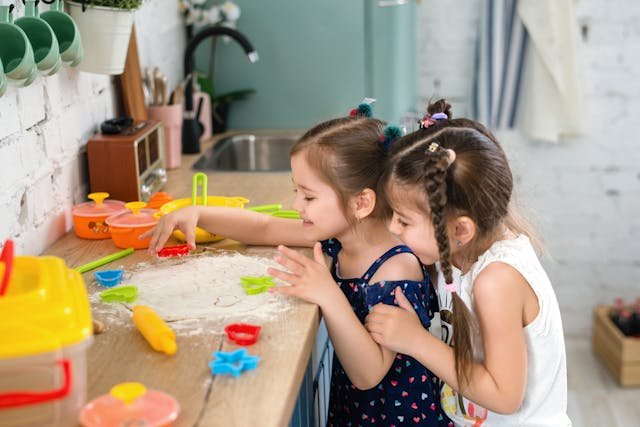
At Debsie, we believe every child is born curious. Our job is to guide that curiosity and help children turn it into knowledge, skills, and confidence. Cognitive development is at the heart of everything we do. Through expert teaching, interactive lessons, and real-world exploration, we help kids grow not just academically, but also in the way they think, reason, and solve problems.
Making Complex Ideas Simple and Fun
Children often find subjects like physics, chemistry, or math intimidating. At Debsie, our teachers break these big topics into small, simple steps that children can understand. For example, instead of just explaining “atoms,” we use fun analogies, experiments, or games to make the idea real. This approach supports cognitive development because children move from memorizing to truly understanding.
Learning Through Play and Exploration
Cognitive growth thrives when kids explore, test, and discover. That’s why Debsie’s curriculum blends structured lessons with playful challenges. Whether it’s coding a simple game, building a science model, or solving a real-life math puzzle, students practice thinking creatively while strengthening memory, focus, and reasoning.
Encouraging Questions and Independent Thinking
We see every “why” as an opportunity. Our teachers don’t just give answers—they guide kids to think critically and find solutions themselves. For example, if a child asks, “Why does ice float?” the teacher may turn it into a mini-experiment. This style encourages children to reason, predict, and reflect—core skills of cognitive development.
Global Classrooms, Shared Perspectives
Cognitive growth also comes from seeing different perspectives. With students joining Debsie from countries around the world, children learn not just science or history, but also empathy, communication, and cultural awareness. They begin to see the world through many lenses, which broadens their reasoning and understanding.
Building Life Skills Beyond Academics
At Debsie, we believe problem-solving, patience, and confidence are just as important as math equations or science facts. Every activity is designed to strengthen these life skills. For instance:
- When coding a project, children learn persistence through trial and error.
- When solving puzzles, they practice logical reasoning.
- When explaining their ideas, they build communication and confidence.
These are the very foundations of strong cognitive development.
The Debsie Promise
For parents, the biggest joy is seeing their child grow—not just in grades, but in curiosity, independence, and problem-solving ability. That’s exactly what Debsie delivers. With passionate teachers, interactive methods, and a supportive global community, we help children unlock their full cognitive potential.
👉 Want to see your child grow into a confident thinker and problem-solver? Book a free trial class at Debsie today.
Challenges in Cognitive Development
Cognitive development is a natural process, but it doesn’t always happen at the same pace for every child. Some kids pick up reading quickly, while others take longer. Some may excel at puzzles but struggle with focus. This variation is normal—but as parents, it’s important to know when challenges might need extra attention.
Every Child Develops at Their Own Pace
First, remember this: no two children are the same. Just because your neighbor’s child started talking in full sentences at age two doesn’t mean your three-year-old is behind. Growth is not a race. Some children are early bloomers in language, while others shine later in reasoning or problem-solving. What matters most is steady progress, not speed.
Common Challenges Parents May Notice
- Difficulty with Attention
If a child struggles to concentrate for even short periods, they may miss chances to absorb new ideas. While short attention spans are normal in toddlers, persistent struggles in older kids might need closer observation. - Slow Language Development
Some children take longer to speak or may have trouble forming sentences. Since language is key to learning, delays here can affect other areas of cognitive growth. - Trouble Remembering
Forgetting instructions, names, or routines more often than peers can sometimes signal issues with working memory. - Struggling with Problem-Solving
If a child avoids challenges, gives up easily, or struggles to think through simple puzzles, they may need more practice with reasoning skills.
When to Be Concerned
Occasional difficulties are part of growing. But if you notice consistent struggles over time—such as a child not meeting milestones in speech, attention, or reasoning—it may be worth seeking professional advice. Early support can make a big difference in helping children catch up and feel confident.
How Parents Can Help
Even when challenges appear, parents can do a lot to support growth at home:
- Break tasks into smaller steps so children don’t feel overwhelmed.
- Celebrate effort, not just results. Confidence builds persistence.
- Use games, songs, and stories to practice attention and memory in fun ways.
- Offer patience and encouragement—pressure often makes learning harder.
The Role of Teachers and Mentors
Parents don’t have to face challenges alone. Teachers, mentors, and learning platforms like Debsie can provide guidance and strategies tailored to each child’s needs. With the right support, most challenges can be overcome, and children can thrive both academically and personally.
Why Cognitive Development Matters for the Future
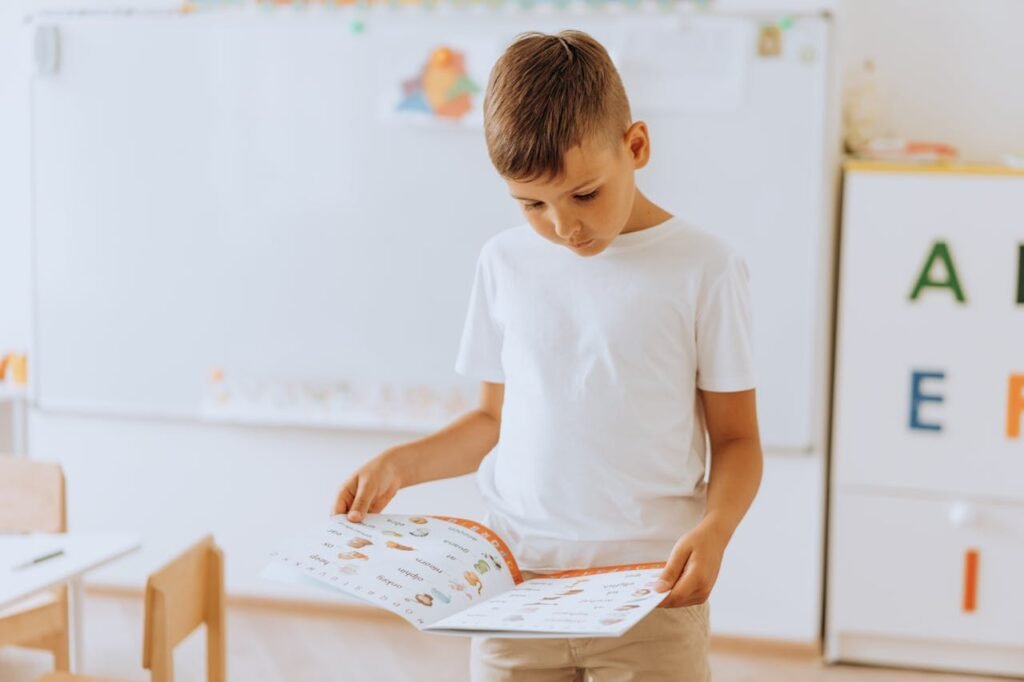
Cognitive development is not just about childhood milestones—it’s about preparing children for a lifetime of learning and problem-solving. The skills your child builds in these early years form the foundation for everything they will face later in school, work, and life.
A Foundation for Academic Success
Strong cognitive skills—like memory, focus, and reasoning—are the tools children use to learn new subjects. For example:
- A good memory helps them retain multiplication tables, historical facts, or vocabulary words.
- Strong focus allows them to complete tasks without being distracted.
- Problem-solving skills help them tackle math equations, science experiments, or essay writing.
Without these skills, even the brightest child may struggle in school. With them, every subject becomes easier to understand and master.
Preparing for Real-World Challenges
Cognitive development also prepares children for life outside the classroom. Think about everyday situations: planning how to spend pocket money, resolving an argument with a friend, or deciding how to organize their time between homework and play.
All of these require thinking skills—reasoning, decision-making, and self-control—that come from cognitive growth. Children who practice these skills early often grow into adults who handle challenges with confidence.
Nurturing Independence and Confidence
As children’s thinking skills grow, so does their independence. A toddler who once relied on you for every choice eventually learns to tie their shoes, pack their bag, and make small decisions. A teenager who debates ideas confidently is practicing the same independence on a larger scale.
Every time a child successfully uses their mind to solve a problem, they gain confidence. They begin to trust their own thinking, and that trust helps them take on bigger challenges in the future.
Shaping Future Innovators and Leaders
The world is changing quickly. The jobs of tomorrow will require creativity, critical thinking, and problem-solving more than ever before. Children who grow up with strong cognitive skills will not just adapt to change—they will lead it.
By nurturing curiosity, patience, and resilience, parents and teachers are raising children who will invent, create, and inspire. In this sense, cognitive development is not only about individual growth—it’s about shaping the future of society.
Conclusion – Helping Young Minds Grow Strong
Cognitive development may sound like a big, complicated idea, but at its heart, it’s about how children learn to think, understand, and make sense of the world. From the first time a baby recognizes a parent’s face to the moment a teenager debates a complex idea, each stage of growth is a stepping stone that builds the foundation for lifelong learning.
For parents, supporting this journey doesn’t mean teaching advanced lessons—it means creating an environment where curiosity thrives. Reading together, encouraging questions, playing games, and involving children in everyday activities are powerful ways to build focus, memory, problem-solving, and creativity. Even small actions, when done consistently, help a child’s mind grow stronger.
At Debsie, this is exactly what we do every day. With passionate teachers and a playful, interactive approach, we turn complex subjects into exciting adventures. We guide children to not only learn facts but to think critically, ask questions, and believe in their own abilities. Because when children grow confident in how they think, they are ready for anything the future holds.
👉 Want to see your child’s curiosity blossom into confidence? Book a free trial class at Debsie today and watch their thinking skills shine.
Read Next:

